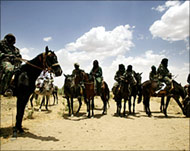Sudanese peace deal ‘in days’
The Sudanese government and rebels from the south of Africa’s largest country expect to sign an agreement in days to end a 21-year civil war, a senior Sudanese official has said.

Talks between Khartoum and the Sudan Peoples Liberation Army (SPLA) have been complicated by issues of oil, ethnicity and ideology, and a separate conflict in the western Darfur region.
“We are anticipating an agreement to be signed within the coming week as (First Vice President) Ali Usman (Muhammad Taha) is due back (in Khartoum) by next Saturday,” said an official who asked not to be named.
Mediators said on Friday the two sides had pledged to reach an agreement in the coming days to end the war that pitted the government against southern rebels fighting for greater autonomy.
The official said the two sides would settle the remaining issues of power sharing and the status of three contested regions.
Human rights
The Sudan government on Friday rejected a human rights report that said it was responsible for crimes against humanity and ethnic cleansing in the troubled western province of Darfur.
 |
|
Pro-government Arab militiamen |
Human Rights Watch said government forces “oversaw and directly participated” in massacres, summary executions of civilians, the burning of towns and villages and the forcible depopulation of areas long inhabited by African Fur, Masalit and Zaghawa tribes.
Foreign Minister Najib al-Khair Abd Al-Wahab insisted the root cause of the fighting that had seen more than a million people driven from their homes was not the actions of government-sponsored militias, but a conflict over resources with an increasingly arid region.
He also said President Umar al-Bashir had formed a fact-finding commission to probe alleged violations of human rights in the region.
Sanctions blamed
Abd Al-Wahab also said the United States and the European Union shared the responsibility for Darfur’s troubles.
“It was their (the European Union and the United States) unwise decision to withdraw development aid and place economic sanctions on Sudan,” he said.
“Those sanctions primarily constituted a punishment to the regions in the Sudan, including Darfur, where development assistance and operations have ceased,” he said.
The Sudanese minister said he had pressed his complaint in a meeting on Saturday with a troika of European diplomats made up of the Dutch charge d’affaires, the British ambassador and the EU representative.